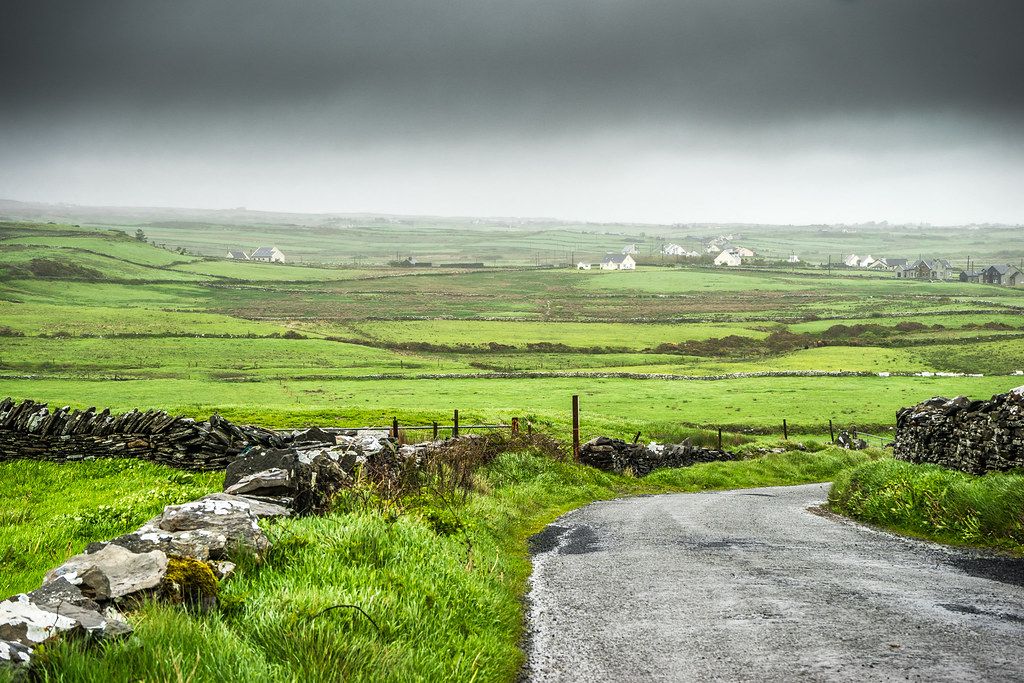CHAT
WITH US
WITH US
GET A
QUOTE
have questions? call us
+44 3330 907053

Blog • Europe • 10 Jul 2024
Share this article
Ireland, with its deep-rooted historical and cultural connections to the UK, is a natural choice for many considering a move. Thanks to the Common Travel Area agreement, UK citizens enjoy the freedom to live, work, and study in Ireland without the need for a visa. This ease of movement makes relocating to Ireland a particularly attractive option for Brits seeking a change of scenery.
However, even with the simplified process, a successful move requires careful planning and preparation. Understanding the nuances of the Irish job market, cost of living, and other practical aspects of life in Ireland is essential. By equipping yourself with this knowledge, you can ensure a smooth transition and make the most of your new life in the Emerald Isle.
Moving from the UK to Ireland is catching on. People are drawn by Ireland's stunning views, many jobs, and special way of life.

Ireland offers a great life quality with its focus on community and well-being. Families love that kids get free education up to age 18. The healthcare here ranked 13th globally in 2017. UK folks get it easily due to special agreements.
Many Irish people also have private health cover, making it a good place for expats to live.
Ireland is full of job chances, especially in tech, pharma, and finance. People from some European countries and the UK can work freely in Ireland. UK residents face no work hurdles, and Ireland's average pay tops the UK's. This makes money a good reason for Brits to move over.
Ireland's stunning views play a big part in people wanting to live there. The wild Atlantic Way and beautiful countryside are big draws. Whether it's the famous Cliffs of Moher or quiet fields, Ireland's beauty is great for both living and working.
There are already more than 100,000 UK expats in Ireland. With its quality life, jobs, and natural beauty, Ireland is becoming more and more popular for these folks.
Are you a UK national thinking of moving to Ireland? You're in luck! Thanks to the Common Travel Area (CFD), you can live, work, and study freely. This is without needing an Ireland visa or residency permit. Yet, things are a bit different if your family members are not from the UK, EEA, or Switzerland.
The CTA is great news for British and Irish citizens. It allows them to move between the countries easily. No visas or residency permits are needed for UK nationals in Ireland because of this. Plus, UK citizens in Ireland can vote in national elections and get social benefits just like the Irish.
Aspect | Benefit |
| Visa Requirements | None |
| Residency Permit | Not required |
| Electoral Rights | Full participation |
| Social Benefits | Equivalent access |
UK nationals need to think about their family members' residency in Ireland. If your family is not from the EEA or Switzerland, there are specific steps to follow. Non-EEA family members have until June 30, 2022, to get a new card. This card makes sure they can still live in Ireland with you.
If a UK national retires in Ireland, they can get pensions from the UK and other EU countries. They also have access to social security benefits. This is based on the laws of the country concerned. So, they support UK citizens living in Ireland fully.
The CTA makes moving to Ireland easier for UK citizens. But, it's crucial to understand what's needed for family members not from the EEA. Knowing these steps ensures your move to Ireland is smooth and legal for everyone
With Brexit now fully in effect, moving from the UK to Ireland has introduced several changes that British citizens must consider. While the Common Travel Area (CTA) between Ireland and the UK remains in place, allowing Irish and UK passport holders to live, work, and access public services in both countries without needing a visa, some regulations have changed due to the UK's exit from the EU.
For UK residents moving to Ireland, there are changes regarding driving licences. While UK driving licences were previously valid across the EU, post-Brexit, UK licence holders living in Ireland must now exchange their UK driving licence for an Irish driving licence. This process is straightforward and can be done through the National Driver Licence Service (NDLS). If you are from Northern Ireland and hold a Northern Irish driving licence, this continues to be valid in both the UK and Ireland.
If you are moving to Ireland with a non-EU spouse, they will need to apply under the Irish immigration rules, including the Preclearance Scheme, to secure their residency rights. While Brexit doesn’t affect the movement of UK citizens directly, non-EU family members may require additional steps, as the UK is no longer part of the EU free movement framework.
Brexit negotiations also impacted frontier workers—those who live in one country and work in another. UK citizens working in Ireland, or Irish citizens working in Northern Ireland, must ensure their status as frontier workers is maintained. They can continue to work across borders, but it is important to stay updated on any new regulatory changes affecting this arrangement.
For those relocating to Ireland, understanding the tax system is very important. Brexit has not altered the taxation rules within the CTA, and UK residents moving to Ireland are subject to the Irish tax system. It’s important to familiarise yourself with income tax, social insurance contributions, and any other relevant taxes in Ireland.
Thinking about moving to Ireland? There are many job options for UK expats. Sectors like technology, pharmaceuticals, and finance are growing fast. Skilled professionals will find open arms.
Ireland's top hiring fields include technology, pharmaceuticals, and finance. The country's tech industry, known as Europe's Silicon Valley, is booming. Big names like Google, Facebook, and Apple have a big presence here. The pharma sector is also strong, offering jobs from names like Pfizer and GlaxoSmithKline.
Sector | Key Employers | Opportunities for UK Expats |
| Technology | Google, Facebook, Apple | Software Engineering, Data Analysis, IT Management |
| Pharmaceuticals | Pfizer, GlaxoSmithKline, Johnson & Johnson | Research, Quality Control, Clinical Trials |
| Finance | Bank of Ireland, AIB, Citibank | Investment Banking, Risk Assessment, Accounting |
Ireland offers good pay, often higher than in the UK. This leads to more money in your pocket. Its strong job laws make sure workers are treated well. They get sick pay, maternity leave, and help payments.
Ready to push your career forward? Ireland is supportive and encouraging. It also fights against job discrimination, making the workplace fair and welcoming for all.
Thinking about moving from the UK to Ireland makes it important to know about living expenses. Though initial costs in Ireland seem high, many factors can make your budget planning better.
In Ireland, eating out and essential items vary from the UK. A meal in Ireland's cheap restaurant costs £14.11 (€16.74), just less than the UK's £15.00 (€17.80). Yet, transport is pricier; a monthly pass is £84.28 (€100.00) in Ireland and £69.78 (€82.80) in the UK, 20.8% more. Yet again, basic utilities in a 915 sq ft home are cheaper in Ireland, at £178.71 (€212.04) compared to the UK's £251.10 (€297.93), showing a 28.8% saving.
The Irish housing market is key. In Dublin's centre, a one-bedroom rent is around €1,400, ranging up to €2,500. Buying a home costs between €395,000 and €675,000, with a 3% deposit. These prices are often better than in parts of the UK, like London. Moreover, the interest rate for a 20-year mortgage is 4.40% in Ireland versus the UK's 5.87%, a 25.0% drop.
The key is that while some expenses like eating out or public transport might be more in Ireland, lower utility costs and good mortgage rates balance this. It's vital to compare costs between the UK and Ireland to understand the real financial differences of moving.

Ireland has many types of accommodation to suit different needs. You might be looking to rent or buy a property. It's key to know how the housing market works to make a good call. Understanding these points can guide you well.
The choice between renting and buying in Ireland is influenced by your budget, lifestyle, and future plans. If you're eyeing Dublin, know that it's a hotspot for rentals with fierce competition. To secure a place, act fast and ensure your paperwork is in order. Those on the social housing list can benefit from the Housing Assistance Payment (HAP), helping with rental costs temporarily.
Opting for property ownership in areas like Cork, Galway, or Limerick might be a wise move. Buyers should explore the Fair Deal Scheme for nursing home choices in Ireland. Also, Safe Home Ireland aids elderly Irish emigrants abroad who want to come back.
Many expats are drawn to Dublin at first for its lively culture and job prospects. Yet, cities like Cork, with its mix of old and new, are great for families and professionals. Galway, famous for its art scene and events, appeals to the creatively minded. And Limerick, a place full of strategic opportunities and a friendly ethos, is also noticed by expats.
Each city in Ireland has its charm. Picking the best spot depends on what you look for and where you work. Keep in mind that the housing scene in Ireland varies a lot by city and neighbourhood.
The Irish education system aims to meet various learning needs. It starts offering education at age four or six. Students learn subjects like English, Irish, Maths, and Arts. The lessons also cover P.E. and social, environmental, and health topics.
About 90% of primary schools in Ireland are linked to the Catholic Church. But, there are options for those preferring different paths. School starts at 9am and ends at 3pm, though times may change for younger children. The school year runs from September to July or August, with holiday breaks around Christmas and Easter.
For secondary education, students aged 12 to 18 follow a three-year Junior Cycle and then a two-year Senior Cycle. During the Senior Cycle, students take the Junior Certificate and Leaving Certificate exams. These exams cover a variety of subjects, including English, Irish, and Maths, plus optional subjects. Some schools also have a Transition Year programme.
In secondary school, lessons go from 9am to 4pm. There are breaks during June, July, August, and Christmas. Students may not have to study the Irish language under certain conditions, like arriving in Ireland after being educated abroad.
Special education in Ireland is offered in different settings, like mainstream schools and special classes or schools. Parents can seek out these schools using an online tool from the Department of Education. It's wise to apply early, as there may be waiting lists. Admission often considers things like how close you live to the school and your child's previous schools.
Irish education up to secondary level is available without charge to those who live in Ireland. Preschool is also free for children aged 2 years and 8 months to 5 years and 6 months. The ECCE program funds preschool education to help children prepare for primary school.
Third-level education in Ireland includes universities, technology institutes, and teaching colleges. Students from Ireland, other EU countries, or Switzerland, who meet certain residency requirements, can study for free. Additionally, they may receive financial aid through the SUSI grant programme.
Education Stage | Age Range | Key Features |
| Primary Education | 4-12 years | Basic subjects including English, Irish, Maths |
| Secondary Education: Junior Cycle | 12-15 years | Junior Certificate, study of 9-10 subjects |
| Secondary Education: Senior Cycle | 15-18 years | Leaving Certificate, study of 6-7 subjects |
| Third-Level Education | 18 years and above | Universities, Technology Institutes, Colleges |
In Ireland, there are apprenticeship schemes for those keen to get hands-on skills. These schemes are in areas like software development, cooking, and building work. Knowing about Irish education is key for families moving to Ireland. The system offers high-quality, accessible education for all, promoting learning for kids and teenagers.
Healthcare in Ireland offers both public and private options. This gives people the freedom to choose what's best for them. It ensures everyone can get the healthcare they need.
In Ireland, the public system offers a range of services. This includes doctor's visits, hospital care, and more. If you qualify for a medical card, you can get these services for free. The CTA agreement also means UK citizens get the same healthcare rights as Irish citizens.
Being eligible for state healthcare means you've lived in Ireland or plan to for a year. You can pay as you use services or get a medical card. There are also special GP visit cards for certain groups, like the elderly or young children, and those with low incomes.
About 400,000 people in Ireland choose private healthcare yearly. This shows the desire for quick and high-quality care. Private hospitals offer one-sixth of all beds. Private health insurance lets you pick your doctor and get treatment faster.
Private insurance in Ireland means less waiting for treatment. It complements the public system well. This mix ensures medical needs are met for all.
Healthcare Aspect | Public System | Private Options |
| Eligibility | Ordinarily resident in Ireland | Private health insurance |
| Key Benefits | Free services with medical card, GP visit cards | Flexibility, quicker access, choice of consultants |
| Access for UK Citizens | Same as Irish citizens under CTA | Private health insurance options available |
| Number Served Annually | N/A | 400,000 |
Ireland's health system scores high globally at 8.9/10 for health. It blends public and private care well. Through medical cards or private insurance, it meets everyone's health needs.
Moving from the UK to Ireland means you need to know about importing and registering vehicles. You'll have to follow certain rules and pay several taxes. These include Motor tax, VAT, and Vehicle Registration Tax (VRT).
Imported cars from the UK to Ireland face a 23% VAT rate. UK-made cars don't have a customs duty, but others do. For a VRT relief, your car must have been used outside Ireland for six months before moving. You may avoid VAT and VRT if you apply within a year of moving and meet some criteria.
You must register your vehicle within 30 days in Ireland. This means a trip to the National Car Test centre with some documents. Registration costs consider emissions and motor tax looks at engine size. Some visitors won't need to register or pay VRT under specific rules.
To swap your UK licence for an Irish one is easy if you're a resident. It's vital you know these details to facilitate your move. The vehicle import and registration steps aim to make things simple for you.
To swap your UK licence for an Irish one is easy if you're a resident. It's vital you know these details to facilitate your move. The vehicle import and registration steps aim to make things simple for you.

Setting up your finances is a crucial step when moving to Ireland. Here's what you need to know:
To open a bank account in Ireland, you'll typically need:
Popular banks in Ireland include AIB, Bank of Ireland, and Ulster Bank.
Ireland uses the Euro (€). Keep an eye on GBP to EUR exchange rates when planning your move.
Ireland is known for its warm hospitality and rich cultural heritage. Here are some aspects of Irish social life:
Pubs are central to Irish social life. They're not just for drinking, but for socializing, music, and often food. Temple Bar in Dublin is a famous area for pubs and nightlife.
GAA sports like Gaelic football and hurling are popular, as well as rugby and soccer. Joining a local sports club can be a great way to meet people.
Ireland hosts many festivals throughout the year. The St. Patrick's Festival in March is the most famous, but there are many others celebrating music, literature, and food.
Ireland's climate is mild but changeable. Expect:
Pack a good raincoat and layers for all seasons!
While English is the primary language, Irish (Gaeilge) is the first official language. Learning some Irish can be a fun way to immerse yourself in the culture. You can start with free resources like Duolingo or local language classes.
Major mobile networks in Ireland include:
You can often use your UK phone in Ireland, but check with your provider about roaming charges.
Broadband is widely available in urban areas. Providers include:
Moving to Ireland from the UK is an exciting adventure. While there are similarities between the two countries, Ireland has its unique charm and challenges. Remember to:
With its stunning landscapes, rich history, and warm people, Ireland offers a wonderful quality of life for those willing to make the move.

Relocating from the UK to Ireland can be a smooth transition thanks to the Common Travel Area agreement. While there are differences in healthcare, education, and daily life, many find the move rewarding. Ireland's growing economy, beautiful scenery, and friendly culture make it an attractive destination for UK expats.
If you’re looking to move to Ireland, why not give Deliver1 a call? We have helped thousands of people move to their new homes abroad, including to Ireland. We have years of experience, and our innovative online booking and management system makes the whole process simple and fast.
Contact us today or get a quick quote online and make your Irish relocation a reality!
We love hearing from you-so please get in touch with any questions or queries.
We love hearing from you-so please get in touch with any questions or queries.
Working hours
Mon - Sat: 08:00 - 17:00
Sun: Closed
Call
+44 3330 907053Location
Unit 3, Newyears Green Lane
Newyears Green
Uxbridge
UB9 6LX
United Kingdom
